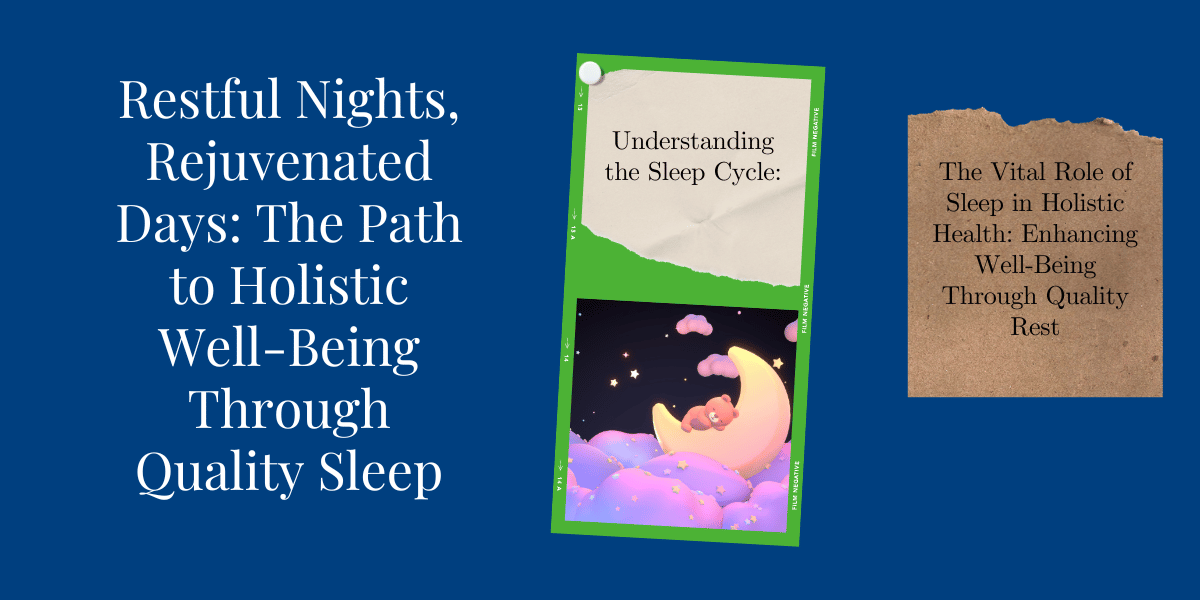Restful Nights, Rejuvenated Days: The Path to Holistic Well-Being Through Quality Sleep
Unlocking the Healing Power of Sleep: A Comprehensive Guide to Holistic Well-Being
The Vital Role of Sleep in Holistic Health: Enhancing Well-Being Through Quality Rest
In the relentless pace of modern life, sleep often takes a backseat, dismissed as a luxury rather than recognized for what it truly is: a fundamental pillar of good health. Yet, the significance of sleep goes far beyond mere rest. It’s a crucial, intricate process that rejuvenates the body and mind, playing a pivotal role in maintaining overall well-being. This article explores the profound role of sleep in holistic health and offers insights into how individuals can enhance their sleep quality through mindful lifestyle modifications.

Understanding the Sleep Cycle:
Sleep is not a uniform state but a series of distinct cycles. These cycles, comprising both Rapid Eye Movement (REM) and Non-REM stages, are essential for various bodily functions. During deep sleep, tissues repair, growth hormones are released, and memories are consolidated. REM sleep, on the other hand, is crucial for cognitive processes and emotional regulation.
The Impact of Poor Sleep on Health:
- Cognitive Decline: Inadequate sleep impairs cognitive functions such as memory, attention, and decision-making, hindering productivity and overall mental sharpness.
- Emotional Well-being: Chronic sleep deprivation increases the risk of mood disorders, including anxiety and depression, affecting emotional stability and resilience.
- Physical Health: Sleep deficiency is linked to obesity, diabetes, cardiovascular diseases, and compromised immune function, weakening the body’s ability to fend off illnesses.
- Reduced Life Expectancy: Studies have shown that consistently poor sleep patterns can lead to a shorter lifespan.
Improving Sleep Quality Through Lifestyle Modifications:
- Establishing a Sleep Routine: Going to bed and waking up at the same time every day, even on weekends, helps regulate the body’s internal clock, enhancing the quality of sleep.
- Creating a Relaxing Bedtime Ritual: Engaging in calming activities like reading, meditation, or gentle stretching before bed signals the body that it’s time to wind down.
- Optimizing Sleep Environment: Keeping the bedroom dark, quiet, and cool creates an ideal sleep environment. Comfortable bedding and a supportive mattress also play vital roles.
- Limiting Screen Time: Blue light from screens disrupts the production of melatonin, a sleep-inducing hormone. Limiting screen time at least an hour before bed promotes better sleep.
- Mindful Nutrition: Avoid heavy meals, caffeine, and excessive liquids close to bedtime to prevent discomfort and nocturnal awakenings.
The Importance of Seeking Professional Help:
For individuals struggling with chronic sleep disturbances or sleep disorders such as insomnia or sleep apnea, seeking professional help from healthcare providers or sleep specialists is essential. Diagnosis and targeted interventions can significantly improve sleep quality and overall health.
In conclusion, sleep is not a passive state but an active, intricate process that is foundational to holistic health. By understanding the critical role of sleep and implementing mindful lifestyle modifications, individuals can pave the way for restorative, rejuvenating sleep. Prioritizing sleep is not just an indulgence but a fundamental investment in one’s physical, mental, and emotional well-being, ensuring a healthier, happier life.




